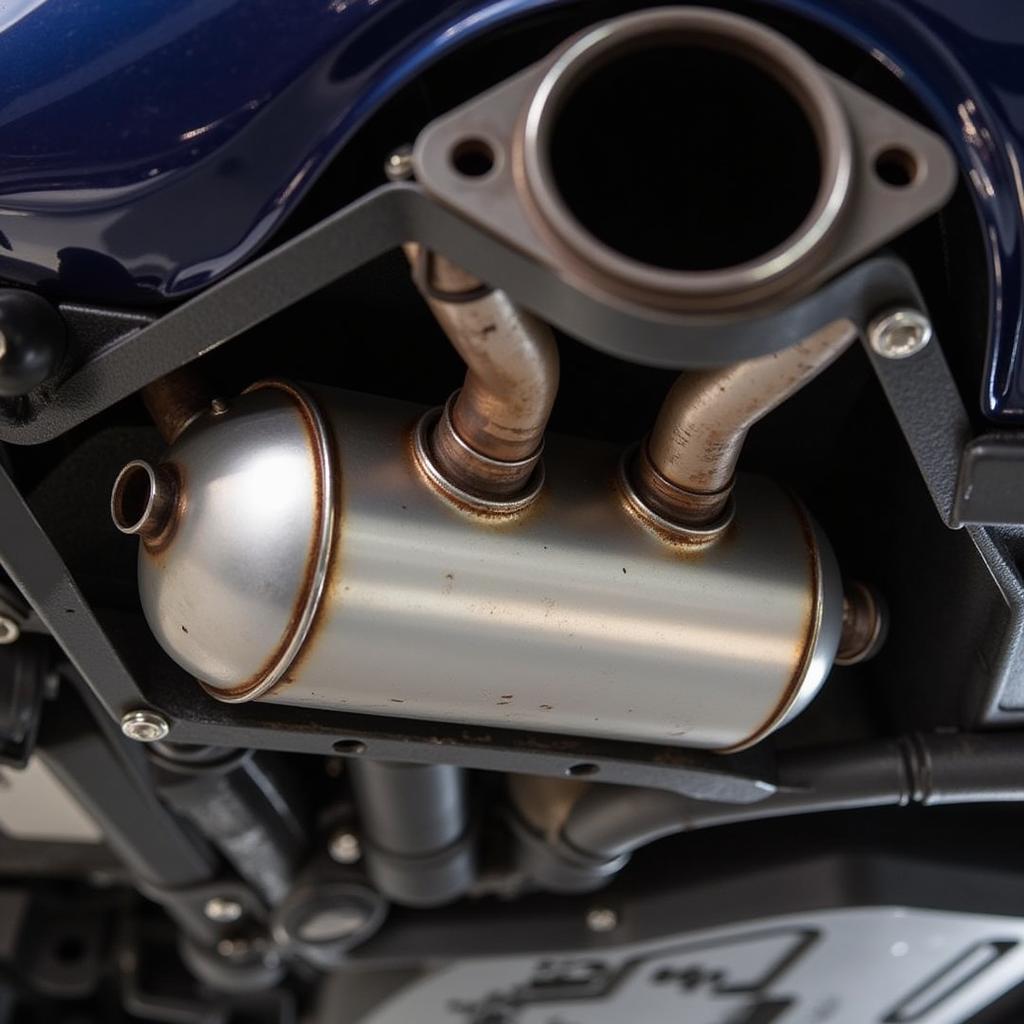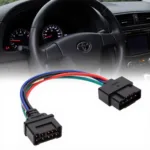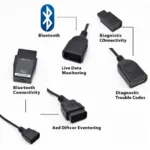If you’re a BMW owner, you’ve likely encountered the dreaded check engine light illuminating your dashboard. While this sight can be unsettling, it’s often accompanied by an OBD2 code that provides insight into the underlying issue. One such code commonly found in BMWs is P0420, indicating a problem with the catalytic converter system. This comprehensive guide will delve into the intricacies of the BMW OBD2 code P0420, helping you understand its causes, symptoms, diagnostic procedures, and potential solutions.
Understanding the BMW OBD2 Code P0420
The P0420 code, specifically “Catalyst System Efficiency Below Threshold (Bank 1)”, suggests that the catalytic converter on engine bank 1 is not functioning optimally. The catalytic converter plays a crucial role in reducing harmful exhaust emissions by converting them into less harmful substances.
In simpler terms, the code indicates that the oxygen sensors upstream and downstream of the catalytic converter are detecting similar oxygen levels, implying that the converter is not effectively cleaning the exhaust gases as it should.
Common Causes of P0420 in BMWs
Several factors can contribute to the P0420 code in BMW vehicles. Identifying the root cause is essential for effective repair. Here are some of the most common culprits:
- Faulty Catalytic Converter: The most likely culprit, a failing catalytic converter, often results from prolonged exposure to high temperatures, internal damage, or contamination from engine oil or coolant.
- Oxygen Sensor Malfunction: While less common, a faulty oxygen sensor (particularly the downstream sensor) can provide inaccurate readings, triggering the P0420 code.
- Exhaust Leaks: Leaks in the exhaust system, either before or after the catalytic converter, can disrupt exhaust flow and affect sensor readings.
- Engine Misfires: Unburned fuel from engine misfires can overheat the catalytic converter, leading to premature failure.
- Faulty Fuel System: Issues like a malfunctioning fuel injector or a leaking fuel pressure regulator can disrupt the air-fuel mixture, impacting catalytic converter efficiency.
Symptoms of a P0420 Code in BMWs
Apart from the illuminated check engine light, you may observe the following symptoms if your BMW is experiencing a P0420 code:
- Reduced Fuel Economy: A drop in fuel efficiency is a common indicator of a catalytic converter problem.
- Sluggish Engine Performance: You might notice a decrease in engine power or acceleration.
- Sulphur-like Odor: A strong, unpleasant smell from the exhaust can be a telltale sign of a failing catalytic converter.
- Failed Emissions Test: A vehicle with a P0420 code will likely fail an emissions test.
Diagnosing the BMW OBD2 Code P0420
Diagnosing the P0420 code accurately is vital to avoid unnecessary repairs. Here’s a step-by-step approach:
- Read the Code: Begin by using an OBD2 scanner to retrieve the stored code. Ensure it is indeed P0420.
- Inspect for Exhaust Leaks: Visually examine the exhaust system for any signs of leaks, such as cracks, holes, or loose connections.
- Check Oxygen Sensor Data: Use the OBD2 scanner to monitor the oxygen sensor readings (both upstream and downstream). Compare the values and look for any inconsistencies or sluggish responses from the downstream sensor.
- Inspect for Engine Misfires: Look for stored codes related to engine misfires, as they can contribute to catalytic converter failure.
- Consider Professional Diagnosis: If the issue persists or you suspect a faulty catalytic converter, seek professional assistance from a qualified mechanic specializing in BMW vehicles.
Potential Solutions for BMW P0420
Once you have accurately diagnosed the underlying cause of the P0420 code, you can explore appropriate solutions:
- Catalytic Converter Replacement: If the catalytic converter is confirmed as faulty, replacement is often the only viable option. Due to their complex construction and precious metal content, catalytic converters can be expensive to replace.
- Oxygen Sensor Replacement: A faulty oxygen sensor should be replaced with a new one that meets BMW’s specifications.
- Exhaust Leak Repair: Repairing any exhaust leaks is crucial to ensure proper exhaust flow and accurate sensor readings.
- Address Engine Misfires: Diagnose and address the root cause of engine misfires, such as faulty spark plugs, ignition coils, or fuel injectors, to prevent further damage to the catalytic converter.
- Fuel System Repair: Resolve any issues within the fuel system, including faulty injectors or pressure regulators, to maintain the correct air-fuel mixture.
Frequently Asked Questions about BMW OBD2 Code P0420
Q: Can I drive my BMW with a P0420 code?
While driving your BMW with a P0420 code for a short period might be possible, it’s not recommended. Driving with a faulty catalytic converter can lead to further damage to your vehicle’s exhaust system and potentially cause your BMW to fail an emissions test.
Q: How long does a BMW catalytic converter last?
A well-maintained BMW catalytic converter can last for 100,000 miles or more. However, factors like driving habits, fuel quality, and engine condition can influence its lifespan.
Q: Are aftermarket catalytic converters a good option for BMWs?
While aftermarket catalytic converters are available at lower costs, it’s generally recommended to use OEM (Original Equipment Manufacturer) parts for BMWs. OEM parts often offer better compatibility, performance, and longevity.
Seeking Expert Help
If you’re facing the P0420 code in your BMW, don’t hesitate to seek professional assistance. Our team of certified BMW technicians is well-equipped to diagnose and resolve complex automotive issues. Contact us today for a thorough inspection and expert solutions tailored to your BMW’s specific needs.
Need help with other BMW OBD2 codes? Check out our resources on BMW E46 OBD2 codes or explore information on the 2008 BMW OBD2 protocol. For those interested in versatile diagnostic tools, we also offer insights into universal OBD2 code readers. You can find specific guides for different BMW models, such as the OBD2 BMW E87, on our website.
Remember, timely diagnosis and repair can save you from costly repairs down the road and keep your BMW running smoothly for years to come. If you need assistance with a Dodge Stratus, we also have a comprehensive guide on OBD2 Dodge Stratus codes. For any further inquiries or support, feel free to reach out to our dedicated customer service team via WhatsApp: +1(641)206-8880 or Email: [email protected]. We are available 24/7 to assist you.


